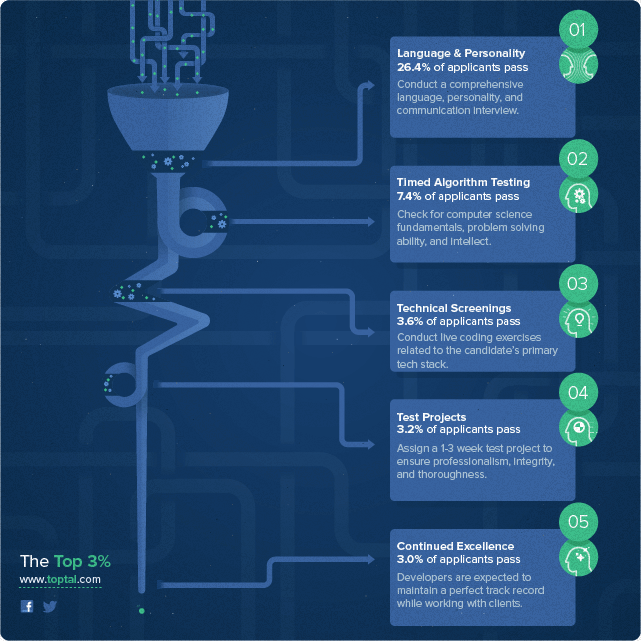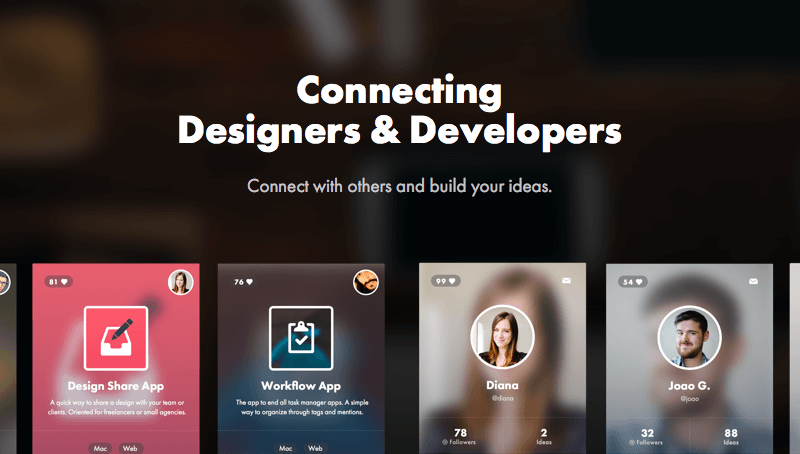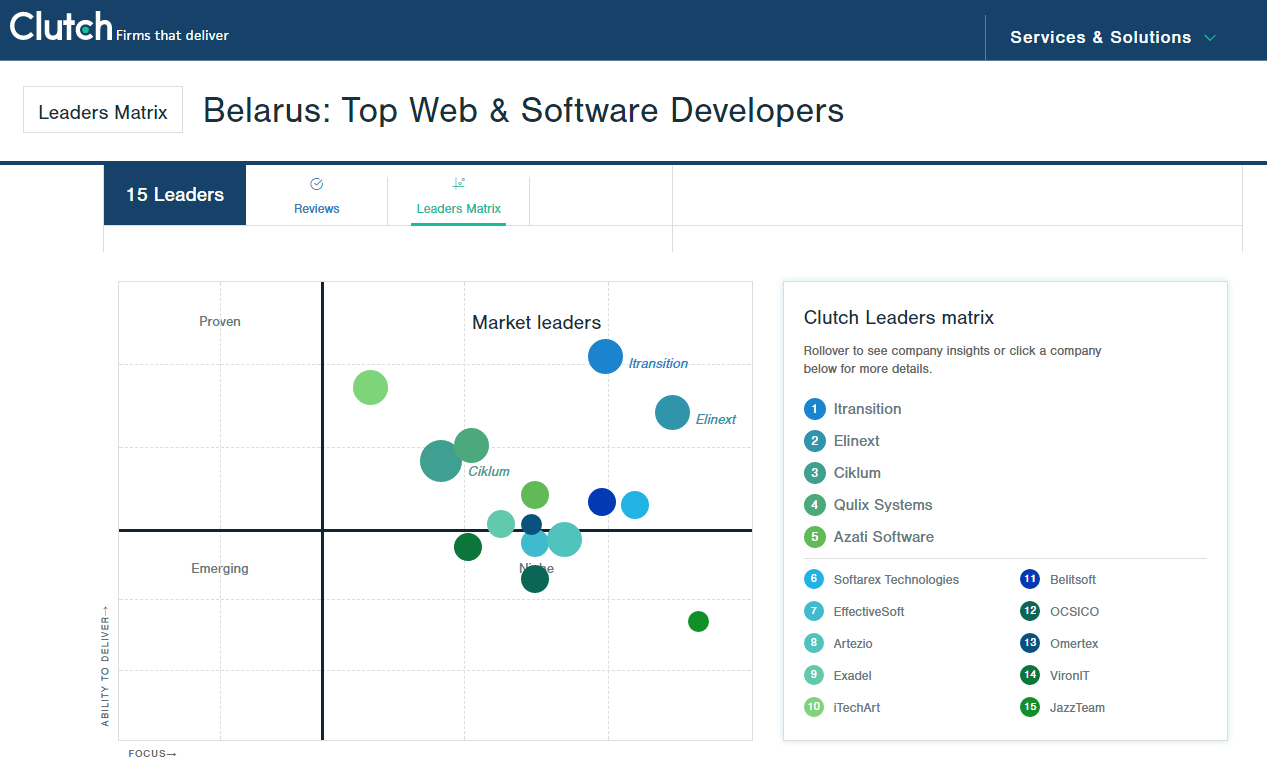Sometimes choosing a developer is as simple as asking a fellow business whom they use in their projects. However, other times you have to go through selection routines. Your main objective must be to create your own list of suitable developers, which conforms with your needs, and then reduce this list to your future team.
Do you really need to hire an outsourcer?
If you want your project to be completed by targeted professionals, don’t rush into digging in search engines or LinkedIn against cheap and low-qualified resources. To make sure you’re hunting for the appropriate talents according to your project requirements at a reasonable price, you need to draw a plan and make a proper research in a few steps:
- Identify your needs. Create a small document where you can specify all the basic characteristics, features, and business requirements.
- Research the market against the similar solution. This will help you better outline what features, UI elements, or design patterns you want to use in your future app. Sometimes, the research stops at this stage, whilst you feel the need of proper business consultancy, so you omit the following steps and go straight to finding business analytic across the outsourcing portals.
- Review your resources, scope, and budget. If you’re a non-tech company & don’t know how to outsource software development, just start straight away with an offshore company and deliver your project idea. Your vendor should go with a comprehensive business research, conduct proof of concept and suggest appropriate solution.
However, if you have your own IT team, it won’t hurt you to evaluate their competency to build your project and decide whether you need to augment your team or hire a full pool of developers. Your budget limits will affect the choice of the platform to post your project – more details will be covered below.
- Evaluate the options. Once you made up your mind on hiring external resources, it’s time to post a project on the net. The journey starts from the multiple platforms for hiring software developers – some of them offer freelance individuals or teams, others give you an opportunity to select from top talents at a time-proven company. Let’s walk through the most popular portals offering software developers.
How to evaluate the potential vendor?
Now that you decided to augment your team with someone from the outside of your company, the next step is to identify the details. Regardless of the platform where you are going to look for the potential software vendors, there are some common challenges and considerations for outsourcing. Software development resource market can be roughly divided into the following regions: the US, Latin America, Western Europe, Eastern Europe, and Asia.
US based freelancers are the most expensive and in high demand. Skilled developers in the US can costs from $70 to $150+ USD per hour, while Latin America offers talents for the price range from $30 to $70; India and China from $20 to $50 per hour. The Eastern Europe market is gaining rapid popularity due to its reasonable prices from $25 to $50 per hour and highly qualified developers.
However, the price is not the only consideration when outsourcing to other countries – evaluate vendor environment – real estate prices, taxes, GDP – and cultural match regarding language conformity and approach to work.
How to decide whether you need a company vendor or a freelancer?
Freelancer:
Scale: Small project;
Goal: To augment team;
Cost: From $10 USD / hour.
Company:
Scale: Long-term contract with trusted partner;
Goal: To build solution from scratch;
Cost: From $20 USD / hour depending on the region.
Where to find your software vendor?
1. Freelance platforms: Upwork, Freelancer.com, People Per Hour.
Upwork – world’s most popular freelance platform resulting from the merge of ODesk and Elance. The benefit of choosing this platform lies in the opportunity to hire a team belonging to one company.
Freelancer.com – a portal offering quite a large pool of freelancers with a complex interface. Unlike Upwork, this site lacks the option to hire a team of developers instead of assigning separate resources and aggregating their work into one project.
People per Hour is another UK-based outsourcing marketplace which offers coding expert for the necessary.
Tips for choosing a candidate:
- Make your descriptions in as many details as possible. Explain what you expect from your vendors, how long your project is going to last, how much you are ready to pay, provide the information on the technology stack used in a project. You’ll be surprised how many candidates can be filtered by these simple trick.
- Mind the rating: high-rated developers are rarely free, and some unrated developers are busy in real life so that they don’t have many clients on Upwork or Freelancer.com.
- Don’t stop at the first appropriate freelancer. Consider 5-10 candidates and let them go through test task. After that, conduct an interview with top talents.
Pricing: from $10.00 /day per full-time frontend or backend engineer.
Our view: Looking for a developer within these platforms doesn’t fit well with a high-end company, projects are mostly small and freelancers are less reputable, however, these portals will make sense for low level tasks in companies who have the time and experience to check and interview candidates.
2. “Premium”- talent platforms: Toptal, Crew, etc.
TopTal is known for its meticulous screening and selection process to offer top 3% of all applicants in their marketplace. They claim to test developers for language and personality and also ask applicants to undergo a timed algorithm test, test screenings, and even complete test projects.
Crew – Crew works the same way as Toptal does, offering developers and designers on the basis of matching necessary professionals to your project with whom you can start working within 48 hours.
Pricing: an average of $60.00 – $200.00+/day per full-time frontend or backend engineer.
Our view: While we wouldn’t recommend you to use Crew or Toptal for a project you could outsource to a freelancer (cron jobs, scrapers, simple one-week projects), you can use these services when you either need something designed well or expertise-based.
3. Partnering marketplaces and meet-ups
Build It With Me – platform for posting your projects and finding a partner. This website differs from others in the way that it is not a marketplace of freelance developers, it is more like a collaboration platform for like-minded professionals. You post your ideas followed by the description, application snapshots and links to your website/portfolio and specify whom would you need to reinforce your team.
Meetup is the platform to find a like-minded partner. This app may not work immediately for finding a developer for your current project, however, in the long run, you can benefit from its promotional opportunities, and connect to the people with necessary skills.
Pricing: not indicated/upon request.
Our view: These platforms are a good fit for those who cannot find funding for their app idea or get stuck at some stage of the development. Here they can connect with a partner who has a talent pool to complete the work on your app.
4. Directories
Clutch.co is probably the most popular B2B platform researching top developers and solution providers from all over the world. The logic of selecting a developer there is simple: If we see good feedback from other companies, it’s easier to make a decision to hire them.
The core of the platform is Leaders Matrix where developers are arranged according to their industry and rating within the platform.
Whenever you are searching for a software vendor at Clutch.co, don’t rush into working with the companies in the top, mind the following steps:
- Choose a category or research Leader Matrix, select those companies that match your price and delivery rates expectations. Read the detailed reviews of their partners and clients.
- Find them in Google, look through their websites, study their case studies, check the quality of products/solution they delivered.
- Contact them. Ask them for an estimate of time and resources, listen to their language, check their competence.
- Select the best fit.
Our view: Businessofapps.com or Angel.co also work according to this principle. All of these platforms are a better choice for larger companies, as the presence of the potential vendor within such a directory proves their credibility and means they value their reputation and won’t let you down.
5. Search engines – Google, Yahoo, Bing
Free, anonymous, quick – search engines are probably the first place for a brief outlook of the services you need. Search engines encompass the largest amount of information, however, the abundance of ads and SEO-promoted companies encourages you to search more thoroughly.
Tips:
- Search deeper than 1-2 pages, or set 100 results per page.
- Try filtering results by region/language/business sector.
- Exclude the words that will lead you to irrelevant results (“free”, “premium”, etc.).
- Change your request slightly to toss the results.
Our view: Search engines are often wrongly conceived as “dump”. Indeed, they provide a valuable mine of information, if used sensibly.
The bottom line is this:
- Freelancing is less beneficial in the long run, so the only reasonable option for a large business is to outsource to a company.
- Looking for a company don’t rely much on search engines, better consult directories and see real customers’ testimonials.
- If you don’t know where to start, try meetups or hackathons and talk to like-minders.
- Good luck in finding an amazing partner!












